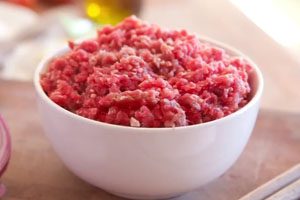
E. Coli Outbreak Linked To Undercooked Ground Beef The Associated Press is reporting on yet another E. coli outbreak in which eight people have been diagnosed with food borne illnesses that seem to be possibly linked to undercooked ground beef. The E. coli cases were reported in Vermont’s Chittenden and Washington counties. Acting State Epidemiologist […]

E. Coli Outbreak Linked To Undercooked Ground Beef The Associated Press is reporting on yet another E. coli outbreak in which eight people have been diagnosed with food borne illnesses that seem to be possibly linked to undercooked ground beef. The E. coli cases were reported in Vermont’s Chittenden and Washington counties.
Acting State Epidemiologist Patsy Kelso reported that the Vermont Health Department is working to track down the illness’ source, but were focused on ground beef. Kelso also stated that all of the people who fell ill from apparent E. coli poisoning reported having eaten out. Kelso warns that this does not mean that restaurants are the only source of E coli contaminated food. The Health Department there is warning people not to eat undercooked hamburger and also recommends avoiding unpasteurized milk, and washing fruits and vegetables.
E. coli has been in the news constantly lately and earlier today we reported on another emerging outbreak in Canada’s North Bay Parry Sound District that appears to be food borne and linked to E. coli. In that outbreak, laboratory tests confirm at least one person is ill, with at least 13 other cases under investigation.
E. coli are a group of bacteria found in animal intestines and feces. Some strains are necessary for digestion; some are harmful, even deadly, such as the very rare and toxin-producing strain E. coli O111 that made headlines in the recent Oklahoma outbreak representing the largest U.S. outbreak of E. coli O111 in history. Also, of concern is the virulent, sometimes deadly E. coli O157:H7 strain that is generally found to be the culprit in E. coli-related food-borne illness outbreaks. Both strains are among those E. coli that may cause serious disease and death and are in a group called Verocytotoxigenic E. coli (VTEC) that are linked to food poisoning. VTECs are very serious and can cause fatal blood poisoning, cystitis, deadly septicemia, and death.
In the US, E. coli is the leading cause of food-borne illness, accounting for about 73,000 infections and 61 deaths; last year, over 22 million pounds of beef and vegetables were recalled due to E. coli outbreaks. Worse, food borne contaminations are exacerbated with a food path that is difficult to police because the food-surveillance system is outdated, under-funded, and overwhelmed by the emergence of mega-farms, mega-distribution centers, and mega-transporters. Couple this with the overarching problem with infectious diseases, which are now becoming more resistant to bacteria because of antibiotic overuse and abuse.
Instances of drug resistant E. coli are being reported world-wide and are similar in path to a mutated staph called MRSA, Methicillin-resistant Staphylococcus aureus that, when not treated early, is resistant to all but the one antibiotic of last resort. In addition to the spread of E. coli and the growing antibiotic resistance of infections, there is compelling data that the negative health effects of E. coli can remain for months and years later confirming these illnesses can have long-term, lasting effects that can either linger for months or years or can show up months or years—as late as 10-to-20 years—after the original illness.
The personal injury attorneys at Parker Waichman LLP offer free, no-obligation case evaluations. For more information, fill out our online contact form or call 1-800-YOURLAWYER (1-800-968-7529).


